Almost a third of homes targeted by Reeves’s ‘mansion tax’ will be flats
Almost a third of the properties expected to be hit by Rachel Reeves’s planned £600m “mansion tax” are flats, new analysis suggests.
Around 100,000 apartments are likely to face a new surcharge – which will affect properties in the highest three council tax bands in England, according to estate agency Hamptons.
The types of flats affected are both apartments in new build towers with amenities such as concierges, gyms or swimming pools, as well as three or four-bedroom properties in converted townhouses or older buildings.
Tom Bill, head of UK residential research at Knight Frank, said: “The Treasury will be delighted that the term ‘mansion tax’ has caught on among Labour backbenchers, but it’s unlikely to reflect the reality on the ground for many homes.”
The Chancellor is preparing to announce an additional charge on the nation’s most valuable homes at next week’s Budget. The new tax will affect properties in council tax bands F, G and H, and is expected to hit around 300,000 properties, according to government insiders.
As part of the plan, officials are preparing to revalue the 2.4 million homes currently in the highest three council tax bands. In England, the tax is currently based on property values from 1991.
Hamptons looked at the 300,000 most expensive properties across the country based on their most recent sale prices.
The vast majority are already in the top three council tax bands, so likely to be covered by the revaluation. The estate agency’s analysis suggests that the surcharge would kick-in for properties sold for £1.5m or more.
Flats expected to be hit by the new surcharge are concentrated in areas of London such as Kensington and Chelsea, Westminster and Camden.
Several are in properties that have been converted into flats in recent years, according to David Fell, lead analyst at Hamptons.
Mr Fell said: “Where these flats were bought in the last decade, in many cases, these are homes that are no longer worth what their owners originally paid for them.”
Hamptons found more than nine in 10 of the 300,000 properties likely to be hit by are in London and the South East.
b’
‘
Owners of the homes affected could also face council tax bills of more than £6,000 a year, according to Hamptons, with the extra bill from the surcharge averaging about £2,000 per year.
Separate analysis by Savills shows 44pc of all band H properties in England are in London, along with a quarter in band G and 22pc of band F. Collectively, 15.4pc of all homes in the capital fall into one of the top three council tax bands.



Leave a Comment
Your email address will not be published. Required fields are marked *